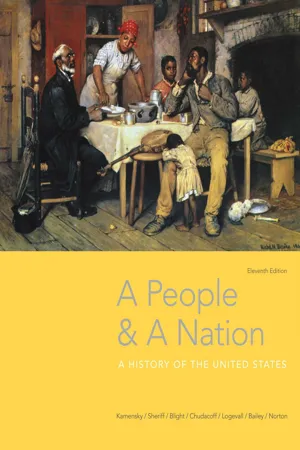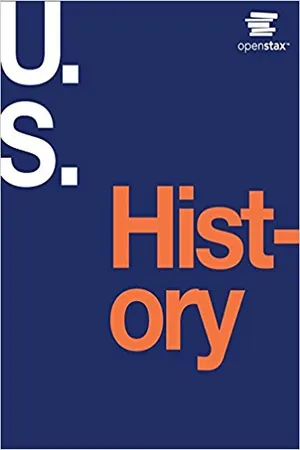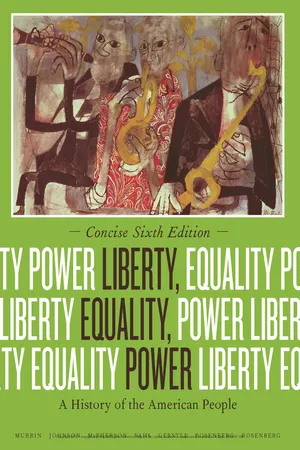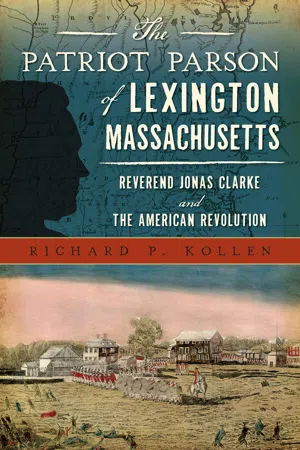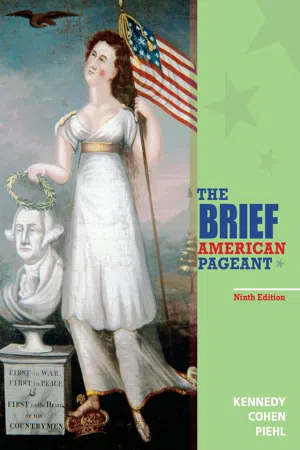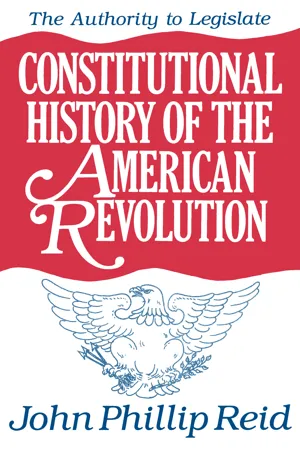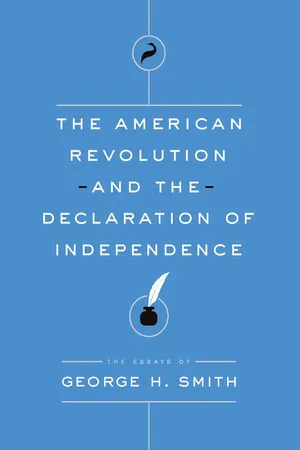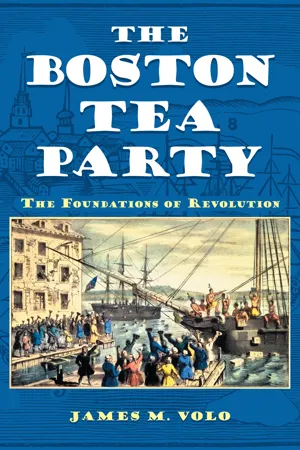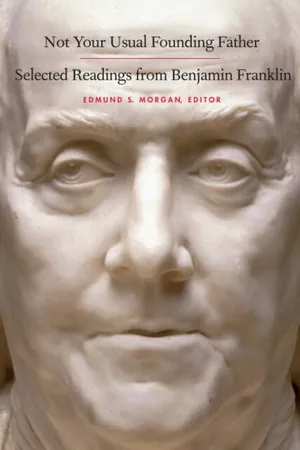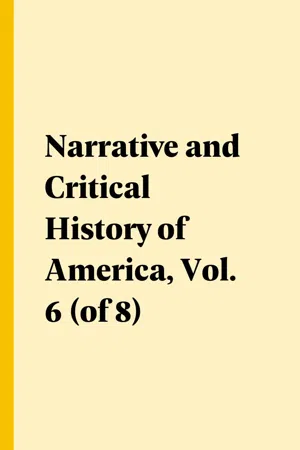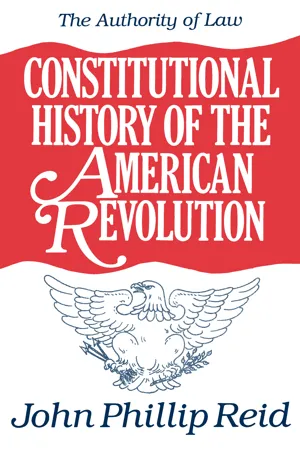History
Townshend Act
The Townshend Acts were a series of laws passed by the British Parliament in 1767, imposing new taxes on items such as glass, lead, paint, and tea imported to the American colonies. The acts were met with strong resistance from the colonists, leading to boycotts and protests. This further strained the relationship between the colonies and Britain, ultimately contributing to the outbreak of the American Revolutionary War.
Written by Perlego with AI-assistance
Related key terms
1 of 5
11 Key excerpts on "Townshend Act"
- eBook - PDF
A People and a Nation
A History of the United States
- Jane Kamensky, Carol Sheriff, David W. Blight, Howard Chudacoff(Authors)
- 2017(Publication Date)
- Cengage Learning EMEA(Publisher)
An ally of Grenville and a supporter of colonial taxation, Townshend decided to try again to obtain badly needed funds from Britain’s American possessions (see Table 5.1). The duties Townshend proposed in 1767 would be lev- ied on trade goods like paper, glass, and tea, extending the existing Navigation Acts. But the Townshend duties dif- fered from previous cus- toms levies in two ways. First, they applied to items imported into the colonies from Britain, rather than Table 5.1 British Ministries and Their American Policies Head of Ministry Major Acts George Grenville Sugar Act (1764) Currency Act (1764) Stamp Act (1765) Lord Rockingham Stamp Act repealed (1766) Declaratory Act (1766) William Pitt/Charles Townshend Townshend Acts (1767) Lord North Townshend duties (except for tea tax) repealed (1770) Tea Act (1773) Coercive Acts (1774) Quebec Act (1774) Declaratory Act Affirmed parliamentary power to legislate its colonies “in all cases whatsoever.” Copyright 2019 Cengage Learning. All Rights Reserved. May not be copied, scanned, or duplicated, in whole or in part. Due to electronic rights, some third party content may be suppressed from the eBook and/or eChapter(s). Editorial review has deemed that any suppressed content does not materially affect the overall learning experience. Cengage Learning reserves the right to remove additional content at any time if subsequent rights restrictions require it. 5-4 Resistance to the Townshend Acts 135 or drank coffee instead. The best known of the protests, the so-called Edenton Ladies Tea Party, had little to do with tea. It was a meeting of prominent North Carolina women who pledged formally to work for the public good and to support resistance to British measures. Women also encouraged home manufacturing. In many towns, young women calling themselves Daughters of Liberty met to spin in public squares to encourage col- onists to end the colonies’ dependence on British cloth by wearing homespun. - eBook - PDF
- P. Scott Corbett, Volker Janssen, John M. Lund, Todd Pfannestiel, Paul Vickery, Sylvie Waskiewicz(Authors)
- 2014(Publication Date)
- Openstax(Publisher)
The Townshend Revenue Act of 1767 placed duties on various consumer items like paper, paint, lead, tea, and glass. These British goods had to be imported, since the colonies did not have the manufacturing base to produce them. Townshend hoped the new duties would not anger the colonists because they were external taxes, not internal ones like the Stamp Act. In 1766, in arguing before Parliament for the repeal of the Stamp Act, Benjamin Franklin had stated, “I never heard any objection to the right of laying duties to regulate commerce; but a right to lay internal taxes was never supposed to be in parliament, as we are not represented there.” The Indemnity Act of 1767 exempted tea produced by the British East India Company from taxation when it was imported into Great Britain. When the tea was re-exported to the colonies, however, the colonists had to pay taxes on it because of the Revenue Act. Some critics of Parliament on both sides of the Atlantic saw this tax policy as an example of corrupt politicians giving preferable treatment to specific corporate interests, creating a monopoly. The sense that corruption had become entrenched in Parliament only increased colonists’ alarm. In fact, the revenue collected from these duties was only nominally intended to support the British army in America. It actually paid the salaries of some royally appointed judges, governors, and other officials whom the colonial assemblies had traditionally paid. Thanks to the Townshend Revenue Act of 1767, however, these officials no longer relied on colonial leadership for payment. This change gave them a measure of independence from the assemblies, so they could implement parliamentary acts without fear that their pay would be withheld in retaliation. The Revenue Act thus appeared to sever the relationship between governors and assemblies, drawing royal officials closer to the British government and further Chapter 5 | Imperial Reforms and Colonial Protests, 1763-1774 137 - No longer available |Learn more
Liberty, Equality, Power
A History of the American People, Concise Edition
- John Murrin, Paul Johnson, James McPherson, Alice Fahs(Authors)
- 2013(Publication Date)
- Cengage Learning EMEA(Publisher)
The only consistent policy in his political career had been his hard-line attitude toward the colonies. The Townshend Program A central aspect of Townshend ’ s annual budget was the Townshend Revenue Act of 1767, which imposed new duties on imports that the colonies could legally buy only from Britain: tea, paper, glass, red and white lead, and painter ’ s colors. But Townshend also removed more duties on tea within Britain than he could offset with the new revenue collected in the colonies. His real goal, clearly, was to use the new revenues to pay the salaries of governors and judges in the colonies, thereby freeing them from dependence on the assemblies. This devious strategy convinced many colonists that men in the British government were plotting to deprive them of their liberties. The British army also began to withdraw from nearly all frontier posts and concentrate near the coast. Although the primary motive was to save money, the implications were striking: An army far distant from the frontier presumably existed only to police the colonists themselves. Why should they pay costs to enforce policies that would undermine their liberties? Townshend ridiculed the distinction between internal and external taxes but declared that he would honor it anyway. Then, having won approval for his Townshend Revenue Act Passed by Parliament in 1767, this act imposed import duties on tea, paper, glass, red and white lead, and painter ’ s colors. It provoked the imperial crisis of 1767 – 1770. In 1770 Parliament repealed all of the duties except the one on tea. F O C U S Q U E S T I O N If the colonists condemned all par-liamentary taxes for revenue, why did effective resistance to the Townshend Revenue Act take so long to organize, and why did it cease before achieving total repeal? 114 C H A P T E R 5 REFORM, RESISTANCE, REVOLUTION Copyright 2014 Cengage Learning. All Rights Reserved. May not be copied, scanned, or duplicated, in whole or in part. WCN 02-300 - eBook - ePub
- Richard P. Kollen(Author)
- 2016(Publication Date)
- The History Press(Publisher)
Although the Stamp Act’s repeal appeased its opponents momentarily, the British ministry remained determined to use the North American colonies as a revenue source. When the Rockingham administration collapsed, William Pitt, another friend of the American colonies, became prime minister. But Pitt’s chronic gout gave his chancellor of the exchequer, Charles Townshend—a man decidedly unsympathetic to American discourse about liberty—an independent hand in crafting economic policy. The Townshend Revenue Act of 1767 sought to levy a tax and target the revenue to pay royal governors’ and judges’ salaries. Heretofore, provincial assemblies had legislated judicial pay. Not only did the new tax propose to extract revenue from Americans, but Whigs also suspected that it targeted the funds to erode their liberties by removing an institutional check on the executive and judiciary.Parliament enacted Chancellor Townshend’s taxes on British glass, tea, lead, paper and paint, confident that such duties could never be considered internal taxes because England collected the duties externally, at the American ports of entry. But for the Whig opposition, where the British customs service collected the duty mattered little. Unlike the earlier import duty on foreign molasses aimed at redirecting American trade from the French to the British product, these Townshend items had no alternative source. Thus, they were expressly designed to raise revenue pure and simple. Although not levied internally, they remained a tax. John Dickinson of Pennsylvania made just this argument in his four-part “Letters from a Farmer,” published in newspapers throughout the colonies from December 1767 through February 1768. Dickinson also reminded Americans of nonimportation’s effectiveness during the Stamp Act crisis.2Boston responded to the new duties by extending the embargo of British goods, this time beyond merchants. Town meeting adopted a citywide non-consumption plan in an effort to diminish demand for British goods. The plan encouraged country towns to join the boycott. Boston’s town meeting in October furnished a list of items, luxury goods in particular, to boycott after December 31, 1767, among them loaf sugar, coaches, chaises and carriages, gloves, shoes, gold and silver buttons, snuff, malt liquors and glue. Various textiles and fabrics such as silk, cotton, velvets and any broadcloth worth more than ten shillings were included.3 Some criticized the list for omitting the Townshend commodities and urged people to dispense with the items. Taking the lead, a group of Boston ladies swore off “foreign” tea for a year.4 - eBook - PDF
The Brief American Pageant
A History of the Republic
- David Kennedy, Lizabeth Cohen, Mel Piehl, , David Kennedy, Lizabeth Cohen, Mel Piehl(Authors)
- 2015(Publication Date)
- Cengage Learning EMEA(Publisher)
The most important of these new regulations was a light import duty on glass, white lead, paper, paint, and tea. Townshend made this tax, unlike the Stamp Act, an indirect customs duty payable at American ports. Flushed with their recent victory over the stamp tax, the colonists were in a rebellious mood. The impost on tea was especially irksome, for an estimated 1 million people drank the refreshing brew twice a day. The new Townshend revenues, worse yet, would be used to pay the salaries of the royal governors and judges in America. The ultrasuspicious Americans, who had beaten the royal governors into line by controlling the purse, regarded Townshend’s tax as another attempt to enchain them. Their worst fears took on a greater reality when the London government, after passing the Townsh-end taxes, suspended the New York legislature in 1767 for failure to comply with the Quartering Act. Nonimportation agreements, previously potent, were quickly revived against the Townshend Acts. But the agree-ments proved less effective than those devised against the Stamp Act. The colonists, again enjoying prosperity, took the new tax less seriously than might have been expected, largely because it was light and indirect. They found, more-over, that they could secure smuggled tea at a cheap price, and consequently smugglers increased their activities, especially in Massachusetts. British officials, faced with a breakdown of law and order, landed two regiments of troops in Boston in 1768. With liberty-loving colonists mercilessly taunting the often profane and drunken redcoats, a clash between citizens and the “bloody backs” was inevitable. On the Sons of Liberty Patriotic groups that played a central role in agitating against the Stamp Act and enforcing nonimportation agreements. Daughters of Liberty Patriotic groups that played a central role in agitating against the Stamp Act and enforcing nonimportation agreements. - eBook - PDF
Constitutional History of the American Revolution, Volume III
The Authority to Legislate
- John Phillip Reid(Author)
- 2013(Publication Date)
- University of Wisconsin Press(Publisher)
Yet American whigs seem to have voiced more official objec- tions to trial beyond the seas than to any other imperial legislation except parliamentary taxation for the purpose of revenue, and parliamentary abrogation of governmental autonomy in Massachusetts Bay. Perhaps the Act of Henry posed an issue readily understood, about which it was relatively easy to draft resolutions that would arouse political support. From what whigs said, however, they reacted so strongly to the Act of Henry and to the Dockyards Act not because they thought they would be enforced, but because the resurrection of 35 Henry VIII summed up their worst fears of parliamentary supremacy. Townshend ActS The Townshend Acts are at the heart of the revolutionary controversy, yet, due to their diverse nature, discussion is always piecemeal. There were aspects of the acts that concerned Parliament's authority to tax, other aspects that related to London's authority to govern the colonies, and only a portion had to so with the topic of this book, Parliament's authority to legislate. The authority to tax has been dealt with else- where, and the authority to govern must be deferred to another study. 78 Here we are limited to the authority to legislate, an issue to which the Townshend Acts contributed mainly by attempting to create a precedent supporting Parliament's authority to bind the colonies with internal legislation. We are concerned with only one of Charles Townshend's acts, a tax for the purpose of raising revenue placed on four products-glass, paper, paints, and teas-exported from Great Britain and imported into the colonies. The legislative objective was constitutional, not financial. The money was not to relieve British taxpayers-the purpose of the Stamp Act-but to secure tighter control of colonial governance by making local judicial and executive officials dependent on the Crown for their salaries. - eBook - ePub
The American Revolution and the Declaration of Independence
The Essays of George H. Smith
- George H. Smith(Author)
- 2017(Publication Date)
- Libertarianism.org Press(Publisher)
Lord North favored a middle course. He wanted to repeal all the Townshend duties except the duty on tea. This duty, which was quite small, should remain as a symbol of British authority and thereby reaffirm the right of Parliament to tax the American colonies.Lord North got his way. On April 12, 1770, the Townshend duties on glass, paper, and paint were rescinded. Only the tax on tea was retained—a symbolic gesture that would later have profound and irreversible consequences.Passage contains an image
The Boston Tea Party has often been called a pivotal event that led to the American Revolution, but it would be more accurate to say that the British response was the true catalyst.5The Coercive Acts and Their Theoretical SignificanceBeginning in March 1774, in retaliation for the destruction of tea in Boston Harbor, Parliament passed four pieces of legislation known as the Coercive Acts. (Some historians include a fifth, the Quebec Act, among the Coercive Acts, but this had been in the works for some time and was not a direct response to the Boston Tea Party.) These measures, which many Americans called the Intolerable Acts, amounted to a declaration of martial law in Boston. They left Americans with no plausible course of action between the extremes of total submission and revolution.The Coercive Acts closed the Port of Boston (with some minor exceptions) until Bostonians provided restitution to the East India Company, compensated customs officers for their losses, and showed proper respect for law and order. The charter of Massachusetts (its constitution, in effect) was severely altered to give the royal governor extensive powers. He could now appoint or fire “all judges of the inferior courts of common pleas, commissioners of oyer and terminer [i.e., judges who dealt with treason, felonies, and misdemeanors], the attorney general, provosts, marshals, justices of the peace, and other officers of the council or courts of justice.” And “upon every vacancy of the offices of chief justice and judges of the superior court . . . the governor . . . shall have full power and authority to nominate and appoint the persons to succeed to the said offices, who shall hold their commissions during the pleasure of his Majesty.” - eBook - ePub
The Boston Tea Party
The Foundations of Revolution
- James M. Volo(Author)
- 2012(Publication Date)
- Praeger(Publisher)
entire lot in which the Company sold it. The size of an entire lot was often as much as the entire cargo of a ship, or as little as a few dozen chests. The penalty for doing otherwise was forfeiture of the tea and the packages containing it.There was good reason for such regulations. Once landed and removed from its packaging, smuggled tea was impossible to differentiate from legal tea, hence the need to maintain the original packaging. Documents claiming importation from Britain were easily falsified, and legitimate documents could be reused to cover illegal shipments. An unanticipated outcome of these provisions, however, was to discourage English merchants and traders from exporting tea to Ireland and the American colonies where the demand for such large quantities of legitimate tea was not warranted. Unable to assume the risk of dealing in large quantities, small businessmen were virtually squeezed out of the legal trade and many turned to smuggled tea. The Townshend Act of 1767 eased this stricture somewhat, substituting a requirement that the tea should not be exported in quantities less than the whole of the contents of any one chest or other original package in which it had been sold at the public sale held by the Company in London.35Subsequent to the imposition of the Tea Tax of 1773, the Company departed from its established mode of disposing of its teas by public auction to the merchants and wholesalers in London (“by the candle” as previously required by law) and adopted a new system of becoming its own exporter and wholesaler to the colonies. A select group of American merchants was chosen to act as Company consignees to four colonial ports—Boston, New York, Philadelphia, and Charleston. Each of these had been nominated by a London merchant who gave his bond that his American counterpart would remit the required funds and duties to the EIC in London. This policy represented a great reduction in the price of quality tea in America that had hovered around £1 (240d.) per pound for the best type. The arrangement covered all the costs of the tea (shipping, warehousing, etc.) as well as the Townshend duties retained by the EIC and a generous profit fixed at 6 percent to be evenly divided between the colonial consignees and their London sponsors.36 - eBook - PDF
Not Your Usual Founding Father
Selected Readings from Benjamin Franklin
- Benjamin Franklin, Edmund S. Morgan(Authors)
- 2008(Publication Date)
- Yale University Press(Publisher)
The preceding May, Parliament had passed an act that pre-cipitated the final confrontation. The Tea Act of 1773 sought to rescue the East India Company from bankruptcy by measures that enabled the com-pany to sell tea cheaply in the colonies while retaining the tax. It seemed, as it may well have been, an attempt to buy or bribe colonial acquiescence to taxation. The colonists certainly regarded it as a snare and showed their resentment in the famous Boston Tea Party of December 1773, which was only the most violent of colonial responses. When the British answered by closing the port of Boston and altering the Massachusetts government, the other colonies united in defying these ‘‘Intolerable Acts’’ by forming the Continental Congress of 1774. Franklin all but abandoned his wish for the union with Britain that he had so long advocated. By 1775 England could have retained the colonies, as he ex-plained to Admiral Lord Richard Howe, but only by disclaiming any Parliamentary control over them. When Franklin’s friend Joseph Galloway proposed to the Continental Congress a union patterned on Franklin’s Albany Plan, Congress rejected it, and so, when he heard of the Galloway proposal, did Franklin. Arriving back in Philadelphia in May 1775, with war already under way in Massachusetts, Franklin wrote his epitaph for British-American union while rea≈rming his prediction for America’s des-tiny in a letter to David Hartley, his English friend, who would later take part in the peace negotiations of 1782. To David Hall, 1766 Dear Mr. Hall, London, Feb. 24. 1766 The House of Commons after a long Debate, which lasted from Friday 3 aClock to 2 the next Morning, came to a Resolution to repeal the Stamp Act, 275 to 167, the Minority being for explaining and amending. The Party of - eBook - ePub
Narrative and Critical History of America, Vol. 6 (of 8)
The United States of North America, Part I
- Justin Winsor, (Authors)
- 2016(Publication Date)
- Perlego(Publisher)
The difficulty arose from a misconception of the relations of the colonies to the mother country. They were not a part of the realm, and could neither equally share its privileges nor justly bear its burdens. The attempt to bring them within imperial legislation failed, and could only fail. They were colonies; and the chief benefit the parent state could legitimately derive from them was the trade which would flow naturally to Great Britain by reason of the political connection, and would increase with the prosperity of the colonies.Early in 1763 the Bute ministry, of which George Grenville and Charles Townshend were members, entered upon the new policy. To enforce the navigation laws, armed cutters cruised about the British coast and along the American shores; their officers, for the first time, and much to their disgust, being required to act as revenue officers. To give unity to their efforts, an admiral was stationed on the coast. To adjudicate upon seizures of contraband goods, and other offences against the revenue, a vice-admiralty court, with enlarged jurisdiction, and sitting without juries, was set up.[45] Royal governors, hitherto chiefly occupied with domestic administration, were now obliged to watch the commerce of an empire. It was seen long before this time that the successful administration of the new system would require some modification of the provincial charters; but the difficulties were so serious that the matter was deferred.Such was the new order of things. The student who reflects upon the complete and radical change effected or threatened by these new measures, so much at variance with the habits and customary rights of the colonists, breaking up without notice not only illicit but legitimate trade, and sweeping away their commercial prosperity, is no longer at loss to account for the outburst of wrath which followed the Stamp Act, a year later.[46] - eBook - PDF
Constitutional History of the American Revolution, Volume IV
The Authority of Law
- John Phillip Reid(Author)
- 2013(Publication Date)
- University of Wisconsin Press(Publisher)
CHAPTER ONE THE COERCIVE ACTS The Boston Tea Party caused an even greater sensation in the mother country than had the Stamp Act riots. "There never was, since the [Glori- ous] Revolution, so important a crisis in the constitution of this country," a London newspaper told its readers.l Even the opposition in Parliament said something had to be done about Boston. There was, in fact, little disagreement about the need of hitting the town with a bill of pains and penalties. 2 Debate was over the nature of the punishment and its severity. The bill of pains and penalties-actually a statute enacted into law by both houses of Parliament-withdrew from Boston "the officers of his Majesty's customs," and made it unlawful to unladen or to load nonmilitary goods in the bay called the "harbor of Boston." The port was to be closed to all civilian traffic "until it shall sufficiently appear to his Majesty that full satisfaction has been made by or on behalf of the inhabitants of the said town of Boston" to the East India Company for the teas destroyed in the Tea Party. Everyone understood the unstated purpose of the legislation. It was not only to punish Boston. More importantly, Parliament was legis- lating its claim to supremacy, a fact Lord North emphaSized by insisting that the money Boston was ordered to pay the East India Company was damages or compensation. It was not to be referred to as a tax. "I trust we are not now upon any question of that kind," he told the Commons. "We 9 10 THE COERCIVE ACTS are upon a question wherein we will agree whether the right of British subjects should be asserted, whether their property should be protected, whether their injuries should be redressed, and not whether it is right or wrong to lay a tax upon the colonies."3 North stated several purposes for the Boston Port Act-to punish Bos- ton, compensate the East India Company, protect the customs officers, prevent smuggling, and preserve British trade-but no one was misled.
Index pages curate the most relevant extracts from our library of academic textbooks. They’ve been created using an in-house natural language model (NLM), each adding context and meaning to key research topics.
